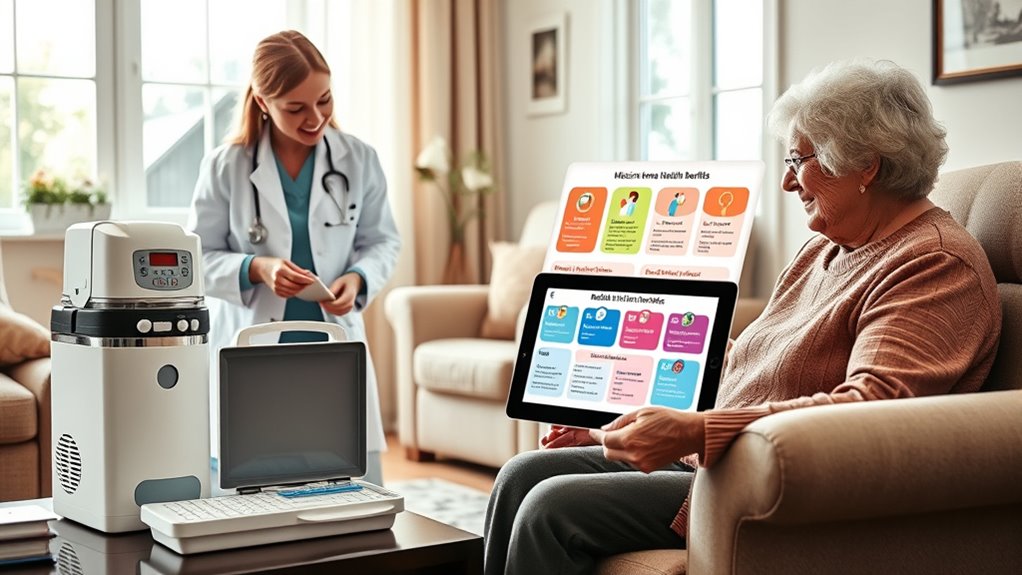In 2025, Medicare offers essential home health benefits for those needing skilled medical care at home. To qualify, you must be enrolled in Medicare Part A and Part B, meet specific health criteria, and be considered homebound. Covered services include nursing, therapy, and home modifications, with telehealth expanding access. Understanding eligibility, billing, and limitations can help you maximize benefits. Keep exploring to learn more about how these services can support your healthcare needs.
Key Takeaways
- Medicare covers skilled nursing, therapy, and home modifications for eligible patients meeting specific criteria in 2025.
- Certification by a doctor and a personalized care plan are required to qualify for home health services.
- Telehealth and remote monitoring technologies are increasingly integrated into home health care in 2025.
- Coverage is limited to certain conditions, visit counts, and skilled services; personal care services are generally excluded.
- Proper documentation, billing tracking, and understanding service limits help optimize benefits and prevent unexpected costs.
Overview of Medicare Home Health Coverage in 2025

In 2025, Medicare continues to provide essential support for home health care, helping eligible beneficiaries receive medical services in their own homes. To qualify for home health coverage, you must meet specific medicare eligibility requirements, including being under a doctor’s care and needing skilled services. Medicare’s coverage emphasizes the use of home health technology, such as remote monitoring devices and telehealth, which enhance patient care and streamline visits. These technologies allow healthcare providers to monitor your condition remotely, reducing the need for frequent in-person visits. Medicare covers a broad range of services, including nursing, therapy, and medical social work, as long as they’re prescribed by your doctor. This coverage guarantees you receive necessary care safely and conveniently, right at home. Additionally, alimony laws and other legal considerations may impact your overall financial planning during this period. Incorporating home health technology can further improve your care experience and outcomes.
Eligibility Criteria for Home Health Services

To qualify for Medicare home health services, you must meet specific eligibility criteria established by the program. Your medicare eligibility depends on being enrolled in Part A and Part B, and you need to have a qualifying medical condition. The home health criteria require that you are homebound, meaning leaving your home is difficult or requires considerable effort. You must also need skilled care from a healthcare professional, such as a nurse or therapist, to treat your condition. Additionally, your doctor must certify that you need intermittent or part-time skilled services, and a plan of care must be established. Meeting these criteria ensures you’re eligible for home health benefits, allowing you to access the necessary support for your healthcare needs at home. Healthcare guidelines are regularly updated to reflect current standards and policies, ensuring appropriate access to services. Creativity can be cultivated by anyone, regardless of skill level, which supports the development of personalized care plans. Understanding grocery store hours can also be helpful in coordinating your healthcare visits around your daily schedule. Knowing the costs of home health care can help you plan financially for your treatment needs.
Types of Services Covered Under Medicare in 2025

What types of services does Medicare cover in 2025? Medicare provides a range of home health services to support your recovery and well-being. This includes skilled nursing care, physical therapy, occupational therapy, and speech-language pathology. Additionally, Medicare now covers home modifications that help you live safely at home, such as ramps or grab bars. Telehealth services have expanded considerably, allowing you to consult with healthcare providers remotely for routine check-ups, follow-ups, or urgent advice. These services aim to improve access and convenience while maintaining quality care. Staying informed about what’s included helps you make the most of your Medicare benefits and ensures you receive extensive support at home. Flexible hours in local gyms illustrate how adaptable services can better meet individual needs, similar to the expanded options in Medicare coverage. As technology advances, AI-driven healthcare solutions are increasingly integrated into home health services to enhance patient monitoring and care management. Recognizing the importance of equipment compatibility ensures that the devices and tools used in home care are effective and safe for patients. Moreover, understanding the safety standards for medical equipment helps prevent potential hazards during home health care. Furthermore, ensuring that the contrast ratio of medical imaging devices meets quality standards can significantly improve diagnostic accuracy in home settings.
How to Qualify for Medicare Home Health Benefits

Understanding whether you qualify for Medicare home health benefits is key to accessing the care you need at home. To qualify, you must be under the care of a doctor who confirms your condition requires skilled services, and you must be considered homebound, meaning leaving home is difficult. Medicare also emphasizes quality improvements, ensuring you receive effective, safe care that meets high standards. Additionally, caregiver support plays a role, as Medicare looks at your ability to manage daily activities and the support system available to you. You need to have a plan that addresses your specific health needs, and these criteria ensure you’re eligible for services that promote recovery and independence while maintaining safety at home. Moreover, understanding forsale 100 can help you explore affordable options for related healthcare needs. Recognizing Medicare coverage policies can assist you in navigating the available benefits and services more effectively. Being aware of eligibility requirements can further help you prepare necessary documentation and streamline the approval process. Knowing how medication management is incorporated into home health services can also enhance your understanding of the care available. Additionally, understanding the importance of preventive care can help you make the most of your benefits and maintain your health proactively.
The Role of a Doctor’s Certification and Care Plan

A doctor’s certification is essential for Medicare home health benefits because it officially confirms that your medical condition requires skilled nursing or therapy services. This certification guarantees that your treatment plan aligns with Medicare guidelines. Once certified, your doctor will develop a detailed care plan that outlines your specific needs. Incorporating self-watering planters into your home environment can support ongoing health and wellness by maintaining proper plant care with minimal effort. This care plan must include: 1. The types of services you’ll receive, like nursing or therapy. 2. The frequency and duration of these services. 3. Clear goals for your recovery or management of your condition. Care plan development ensures your treatments are tailored effectively. Additionally, understanding how vibrational energy influences your health can help you actively participate in your recovery process. Regularly reviewing and updating your care plan is crucial to adapt to changing health needs. Your doctor’s certification and the care plan work together to justify ongoing home health services. They guarantee your eligibility and help ensure you receive appropriate, personalized care in your home.
Changes in Policy and Coverage for 2025

Starting in 2025, Medicare has implemented several policy updates that may affect your home health benefits. These include expanded telehealth services, allowing you to access care remotely more easily, and payment reforms aimed at improving service quality and cost efficiency. These changes mean you’ll see more options for virtual visits and better funding models that prioritize patient outcomes.
| Policy Changes | Impact on You |
|---|---|
| Telehealth expansion | Easier access to healthcare remotely |
| Payment reforms | Improved quality, potential cost savings |
| Coverage updates | More exhaustive support options |
Understanding the Billing Process and Costs

Knowing how Medicare bills for home health services can help you better manage your costs and avoid surprises. The billing intricacies can seem complex, but understanding the process makes cost management easier. First, Medicare generally covers services under a prospective payment system, meaning you pay a fixed copayment per episode. Second, you’ll receive an explanation of benefits (EOB) detailing what’s covered and what you owe. Third, keep track of your visits and services to ensure billing accuracy. Be aware that some services may require prior approval, and unnecessary visits could increase your costs. By understanding these aspects, you can stay on top of your expenses and prevent unexpected charges, making your home health experience more affordable and transparent.
Limitations and Exclusions in Home Health Benefits

While understanding how Medicare bills for home health services is important, it’s equally essential to be aware of the limitations and exclusions that may affect your coverage. Medicare imposes service limitations, meaning not all treatments or visits are covered indefinitely. For example, coverage might be limited to specific conditions or a set number of visits per benefit period. Additionally, there are coverage exclusions that you should know about; services like 24-hour home care, personal care assistance, or homemaker services are generally not covered unless provided as part of skilled nursing or therapy. Recognizing these service limitations and coverage exclusions helps you set realistic expectations and plan accordingly, ensuring you don’t encounter unexpected expenses or denied claims.
Tips for Navigating the Medicare Home Health System

Finding your way through the Medicare home health system can seem complex, but understanding a few key strategies can make the process smoother. First, prioritize home safety by ensuring your environment is free of hazards and meets safety standards. Second, communicate clearly with your healthcare team and ask questions about your care plan to stay informed. Third, seek caregiver support—whether from family, friends, or support groups—to help manage daily tasks and emotional needs. These steps can improve your experience and ensure you receive appropriate care. Remember, advocating for yourself is important; don’t hesitate to request additional resources or clarifications. By focusing on home safety and caregiver support, you’ll steer the system more effectively and feel more confident in managing your home health journey.
Future Developments and Potential Policy Changes

As Medicare continues to evolve, future policy changes and technological advancements are poised to reshape home health benefits. You can expect updates that address demographic shifts, such as the growing aging population, which will influence service availability and funding. Technological advancements, like telehealth and remote monitoring, will likely become more integrated, improving access and efficiency. Policymakers may introduce reforms to better support diverse and increasing needs, potentially expanding coverage or adjusting eligibility criteria. These changes aim to make home health care more personalized, accessible, and sustainable. Staying informed about upcoming policy shifts and technological developments will help you navigate the system more effectively and ensure you receive the most appropriate care as the landscape evolves.
Frequently Asked Questions
How Do I Select a Medicare-Approved Home Health Agency?
To select a Medicare-approved home health agency, start by checking their patient eligibility criteria and confirm they are certified by Medicare. You can visit the Medicare website or call your local agency to verify their certifications. Ask about the services they offer, their staff’s qualifications, and whether they accept your Medicare plan. Choosing an agency with proper certifications and who meets your care needs helps ensure quality, reliable care at home.
Are There Restrictions on the Frequency of Home Visits?
Think of home visits as a carefully choreographed dance—each step planned to meet your needs. There are service limitations on visit frequency, ensuring you get the right amount of care without overdoing it. While restrictions exist, they’re designed to balance quality and efficiency. You won’t be overwhelmed with visits, but you’ll receive consistent support tailored to your health journey. Keep in touch with your provider to stay within these guidelines and get the care you deserve.
Can Family Members or Caregivers Be Compensated for Services?
You might wonder if family caregivers can get compensated for their services. Under current Medicare billing policies, family caregiver compensation isn’t typically covered unless they are hired as home health aides or through specific programs. Medicare generally doesn’t pay for family member services unless they’re formally employed or certified. To navigate this, check the latest Medicare guidelines and explore options for family caregiver support or alternative funding sources.
What Happens if My Condition Worsens Unexpectedly?
When your condition takes an unexpected turn, it’s wise to think of it as a call to enhance your emergency preparedness. You should promptly contact your healthcare provider to discuss your worsening health and explore additional caregiver support options. Staying proactive guarantees you receive the necessary care and assistance, helping you navigate unforeseen changes smoothly. Remember, coordinated efforts and timely communication are key to managing sudden health shifts effectively.
How Do I Appeal a Denied Home Health Claim?
If your home health claim gets denied, don’t worry. You can appeal by reviewing the denial reason, often related to billing errors or documentation requirements. Gather all relevant documents, such as medical records and billing statements, to support your case. Submit a formal appeal to Medicare, clearly explaining why your claim should be approved. Stay proactive, keep copies of everything, and follow the appeal process closely to increase your chances of success.
Conclusion
Managing Medicare home health benefits in 2025 might seem complex, but with the right knowledge, you can access a world of essential support. Remember, understanding eligibility, services, and billing can feel overwhelming—like trying to decode a secret language. Stay informed, ask questions, and advocate for yourself. This system is your lifeline, offering vital care and peace of mind in life’s most critical moments. Empower yourself to make the most of these benefits—your health depends on it.









